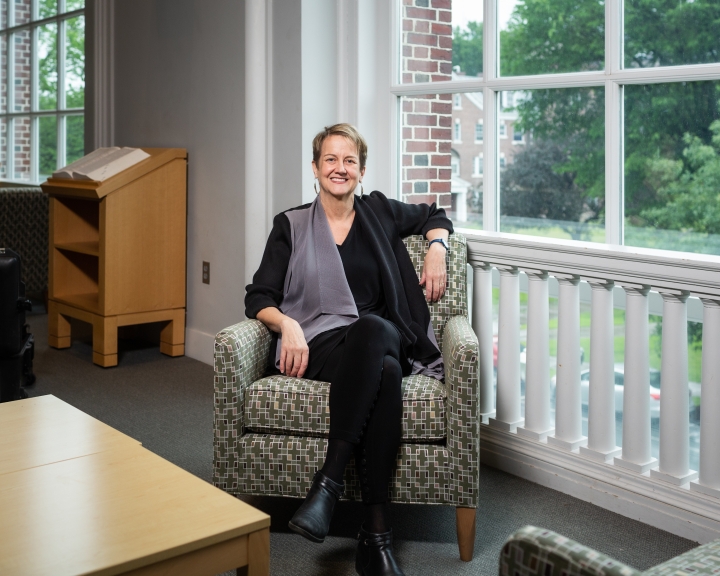Susan Brison, the Susan and James Wright Professor of Computation and Just Communities, has been appointed the inaugural director of the Susan and James Wright Center for the Study of Computation and Just Communities.
Named in honor of the late Dartmouth president and his wife, the Wright Center advances equitable and democratic societies through the study of computational techniques and innovations. It was made possible by a $15.5 million gift from Sally and William H. Neukom ’64, former chair of the Board of Trustees.
As the Wright Center’s inaugural director, Brison is also the first holder of the Susan and James Wright Professorship of Computation and Just Communities.
“I’m grateful to Sally and Bill Neukom for making the Wright Center and professorship possible,” Brison says. “And I’m deeply honored to hold a professorship named after two people so many of us love and admire, Jim and Susan Wright.”
“Professor Susan Brison brings rare and rich knowledge of Dartmouth to the directorship of the Wright Center,” Susan DeBevoise Wright says. “For nearly four decades, Professor Brison has been deeply engaged as a scholar and as a prized teacher to generations of students as well as serving in significant administrative roles. I speak for Jim in saying to his former treasured colleague, ‘Thank you, Susan.’”
A feminist philosopher specializing in free speech theory, Brison works at the intersection of philosophy, law, and politics. She joined the Department of Philosophy in 1985 and also teaches in the Women’s, Gender, and Sexuality Studies Program. Among her many scholarly works, Brison co-edited Free Speech in the Digital Age, a volume of essays that examines how the new technologies and global reach of the Internet are changing the theory and practice of free speech.
Brison is also the author of Aftermath: Violence and the Remaking of a Self, which traces her recovery from a violent assault alongside a philosophical exploration of trauma. A dedicated public philosopher, she has contributed articles about sexual violence to outlets including Time and the New York Times Magazine.
“With her influential scholarship and teaching at the intersection of free speech and technology, Susan Brison is the ideal leader to advance the Wright Center’s vital work fostering equitable societies in the digital age,” says Dean of the Faculty of Arts and Sciences Elizabeth F. Smith.
The Wright Center focuses on a broad range of topics, many of which highlight the double-edged sword of computational advances in public life. This encompasses issues related to democratic values and human rights that span the arts, humanities, social sciences, and sciences. Areas of interest include discrimination and algorithmic bias, the protection of free speech in a time of widespread misinformation, and the dangers—and artistic possibilities—of text and image creation and manipulation.

Brison has long championed ethics as an essential component of technological innovation. She designed a new course on ethics and information technology and taught it in the summer of 2022 and, again, this fall term. This course, two public lecture series, and two faculty workshops Brison co-organized are part of her ongoing effort to ensure that as new technology is being created, ethics and social justice are central to the process.
“Our era of ‘move fast and break things,’ as coined by Mark Zuckerberg, focuses on technical advances, with ethics as an afterthought,” Brison says. “We don’t talk enough about who is getting broken. I’m concerned about technology’s power to inflict harm.”
As part of the Wright Center’s inaugural lecture series this fall, distinguished author and Princeton professor Ruha Benjamin gave a talk on Utopia, Dystopia, or Ustopia? that illuminated relationships between technological innovation, inequity, and discrimination.
On October 23, Mary Anne Franks, a professor at George Washington University Law School and internationally recognized expert on the intersection of civil rights, free speech, and technology, gave a talk entitled Selling Out Free Speech. Franks discussed how the tech industry has accelerated harassment, privacy violations, health misinformation, conspiracy theories, and terrorist propaganda in the name of free speech.
“Ruha Benjamin and Mary Anne Franks are brilliant scholars and fierce advocates for justice for all in the digital age, and I was delighted to bring them to Dartmouth,” Brison says.
With Neukom postdoctoral fellow Jacopo Domenicucci, Brison convened scholars from around the world last month for a Wright Center for Computation and Just Communities workshop on The Personal and the Computational.
Participants explored how pervasive digital technologies interact with key aspects of our personal lives—“our sense of self, our identities, our epistemic situation, our speech environment, and our individual and collective agency,” Brison explains.
Scholarly papers probed topics such as digital personalization and human agency, algorithmic amplification and the right to reach, and value alignment and trust in AI tools.
